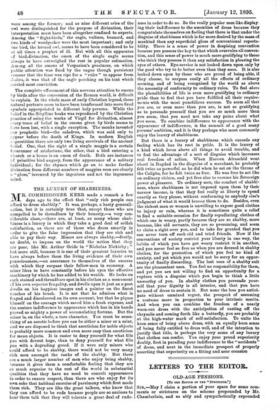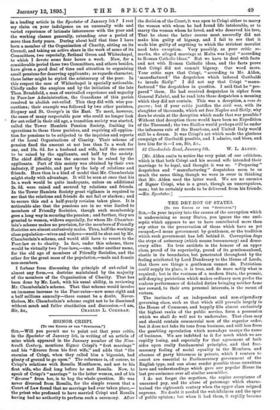LETTERS TO THE EDITOR.
OLD-AGE PENSIONS.
[To THE EDITOR Or THE " SPECTRTOR.".1 Spa,—May I claim a portion of your space for some com- ments or strictures on the scheme propounded by Mr. Chamberlain, and so ably and sympathetically expounded
in a leading article in the Spectator of January 5th ? I rest my claim on your indulgence on an unusually wide and varied experience of intimate intercourse with the poor and the working classes generally, extending over a period of more than forty years. During about half that time I have been a member of the Organisation of Charity, sitting on its Council, and taking an active share in the work of some of its Committees, two especially, Bethnal Green and Whitechapel, to which I devote some four hours a week. Now, for a considerable period these two Committees, and others besides, have given a good deal of time and attention to organising small pensions for deserving applicants; as regards character, these latter might be styled the aristocracy of the poor. In this respect the case of Whitechapel is specially noticeable. Chiefly under the auspices and by the initiation of the late Thos. Brushfield, a man of unrivalled experience and sagacity in Poor-law Administration, the Guardians of this parish resolved to abolish out-relief. This they did with wise pre- cautions; their example was followed by two other parishes, Stepney and St. George's in the East. To meet, however, the cases of many respectable poor who could no longer look for out-relief in their old age, a transition society was started, called the Tower Hamlets Pension Society, limiting its operations to these three parishes, and requiring all applica- tion for pensions to be subjected to the inquiries and reports of the Local Organisations of Charity. Their scheme of pension fixed the amount at not less than 7s. a week for one, and 10s. 6d. for a husband and wife, half the amount to be raised by the applicants, and half by the society. The chief difficulty was the amount to be raised by the applicants. Part of this moiety was obtained by their own industry, if possible, and part by the help of relations and friends. Here then is a kind of model that Mr. Chamberlain might study with advantage. It will be seen at once that his 5s. a week would be quite inadequate, unless an additional 28. 6d. were raised and secured by relations and friends. In the Tower Hamlets Society great vigilance is required to see that the relations and friends do not fail or Blacken; and to secure this end a half-yearly revision takes place. It is noticeable also that the pensions are in no wise limited to members of Friendly Societies, though such membership goes a long way in securing the pension ; and further, they are granted to women, widows especially, for whom Mr. Chamber- lain'e scheme makes no provision, for the members of Friendly Societies are almost exclusively males. Thus, half the working- class population—wives and widows—would be shut out by Mr. 'Chamberlain's scheme, and would still have to resort to the Poor-law or to charity. In fact, under this scheme, there would be virtually two Poor-laws,—one, under another name, for the old age of members of Friendly Societies, and the other for the great mass of the population,—male and female non-members.
I forbear from discussing the principle of out-relief in almost any form,—a doctrine maintained by the majority of the members of the Organisation of Charity. That has been done by Mr. Loch, with his usual ability, in reviewing Mr. Chamberlain's scheme. That that scheme would involve an immense increase to the Poor-rates—now some eight and a half millions annually—there cannot be a doubt. Never- theless, Mr. Chamberlain's scheme ought not to be dismissed without much and fuller elucidation and discussion.—I am,



































 Previous page
Previous page